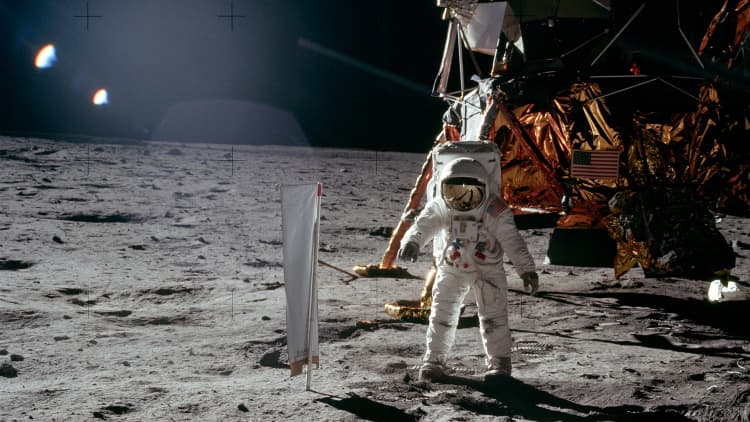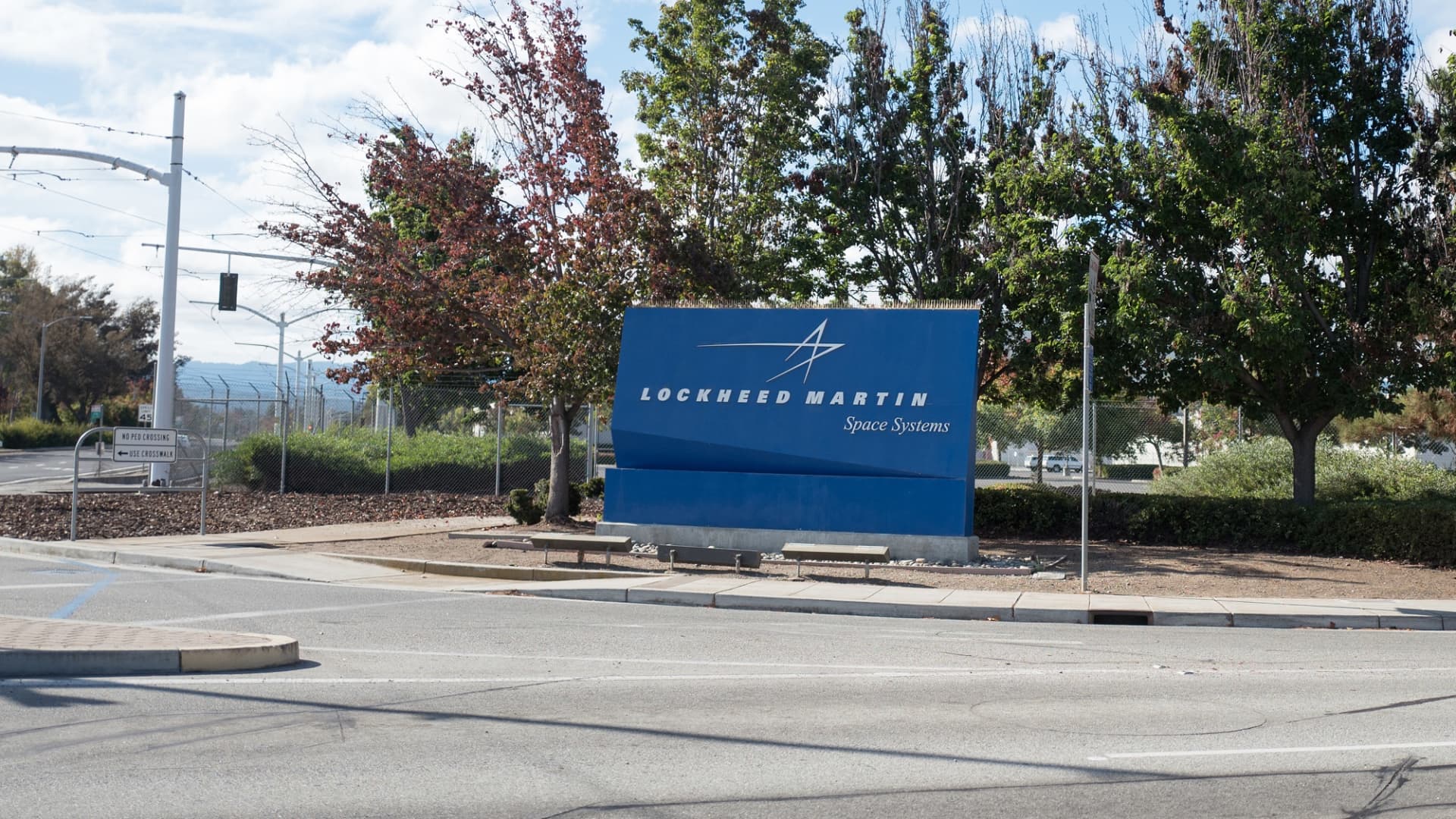Sign at entrance to regional headquarters of Lockheed Martin Space Systems.
Smith Collection/Gado/Getty Images
CNBC’s Investing in Space newsletter offers a view into the business of space exploration and privatization, delivered straight to your inbox. CNBC’s Michael Sheetz reports and curates the latest news, investor updates and exclusive interviews on the most important companies reaching new heights. Sign up to receive future editions.
Overview: Quiet success
Typically, the quarterly reports of U.S. defense giants are a bit of a snooze for space sector watchers. While these companies have space divisions that bring in billions of revenue each year, and I dutifully check in each quarter to see how things are going, the defense primes’ leadership often treat space as a bit of an afterthought.
Performance-wise, their space units are historically steady, with national security sales making up most of those divisions’ revenue each year. But, when Lockheed Martin and Northrop Grumman both reported 2023 results this week, it was a different story.
For both companies, space was the top segment for sales growth in 2023 — by a wide margin. Lockheed’s space unit saw sales grow 9% year over year, versus 2% or less for other segments, while Northrop’s space unit grew sales by 14% year over year, versus 5% or less for other segments.
You’d think with such strong results, space would be a highlight of quarterly earnings calls. But for both Lockheed and Northrop, executives and analysts still only mentioned space in passing. To be fair to those on the calls: Space sales last year were $12.6 billion for Lockheed and $14 billion for Northrop, making up 19% and 36%, respectively, of their total 2023 sales.
Northrop’s call had a bit more insight into why the company isn’t as jazzed about space as the unit’s results would suggest. Northrop leadership said “a lot of our customers are having to address budget prioritization” in years ahead, noting “some shifts in budget priorities.” They weren’t more specific on which parts of its space business are feeling those shifts, only noting that the shift is expected to see “declines in a restricted program.” Yet, Northrop is still confident that those declines will be “more than offset by growth in other parts of the space portfolio.”
Both companies also called out the same highlight: ULA’s recent successful Vulcan rocket debut. Lockheed owns half of ULA and Northrop makes Vulcan’s solid rocket boosters.
ULA’s owners Boeing and Lockheed are reportedly getting close to selling the rocket company, and when my colleague Morgan Brennan spoke to Lockheed CFO Jay Malave earlier this week, he had this to say:
“They had a successful Vulcan launch, which we’re very excited about – very proud of that result. You know, we like the business. It’s got a strong book of business, excellent backlog, it’s got the national security launches … so we’re happy with that business. We’ve got a good partner with Boeing on that and we’re satisfied with where that business is. As far as anything else, we just really won’t comment on that.”
What’s up
- Japan lands on the moon to become the fifth country to reach the lunar surface. The country’s SLIM lander touched down on a cargo research mission, carrying scientific payloads and lunar rovers. One of the rovers captured an image of SLIM, which showed the lander had touched down on its side but was still intact. – CNBC / JAXA
- Sierra Space completes first full-size inflatable habitat burst test, a milestone for demonstrating the sustained pressures needed to use the system in space. – Sierra Space
- Belgium signs Artemis Accords, the 34th country to join the set of space exploration principles. – NASA
- NASA outlines remaining milestones for Boeing’s first crewed Starliner launch, which the agency said remains on target for mid-April. – NASA
- Axiom’s third mission reaches the ISS, carrying a quartet of European citizens to the space station on SpaceX’s Falcon 9 and Crew Dragon system. – SpaceNews
- SpaceX and Texas discuss exchanging land at Boca Chica State Park, with the company requesting 43 acres. In exchange, SpaceX would gift Texas Park and Wildlife with 477 acres near Laguna Atascosa Wildlife Refuge. A government decision is expected in March, after the state commission received a majority of public comments that were opposed to the plan. – Valley Central / Texas Public Radio
Industry maneuvers
- Lufthansa expands Viasat inflight WiFi deal, planning to equip the company’s satellite connectivity on an additional 150 aircraft for the group’s Lufthansa, SWISS and Austrian Airlines fleets. Lufthansa Group previously had an inflight Wifi deal with Inmarsat, acquired by Viasat last year, for 240 aircraft. – Viasat
- Satellite imagery startup Albedo raises $35 million in a round led by Standard Investments and joined by Booz Allen Ventures, Cubit Capital, Bill Perkins, Breakthrough Energy Ventures, Shield Capital, Initialized Capital, Y Combinator, Giant Step Capital and Republic Capital. The company said the funds will be used to launch Albedo’s first operational satellite. – Albedo
- Blue Origin awarded $18 million Space Force study contract to analyze its New Glenn rocket’s compatibility with potential missions planned later this decade, marking a key step toward the company’s participation in the upcoming National Security Space Launch Phase 3 program. – SpaceNews
- NRO adds Firefly’s Alpha rocket to ‘Streamlined Launch’ contract, a $700 million program the NRO is running “to leverage commercial best practices for responsive space missions and encourage competition among emerging launch providers.” – Firefly Aerospace
Market movers
Boldly going
- Philip Hover-Smoot named CEO of startup Scout Space: He succeeds co-founder and CEO Eric Ingram, who will become the company’s chairman and chief strategy officer. – Scout
- Marshall Smith promoted to Chief Technology Officer of Voyager Space and named to the company’s joint venture Starlab Space’s board. Smith was previously Voyager’s vice president of exploration. – Voyager
- Matthew Isakowitz Fellowship Program names 31 students to summer program, as the nonprofit continues to help support individuals land internship at space companies across the sector. – Matthew Isakowitz Fellowship Program
On the horizon
- Jan. 26: Virgin Galactic Unity launches Galactic-6 mission from New Mexico.
- Jan. 27: Rocket Lab Electron launches Spire satellites from New Zealand.
- Jan. 28: SpaceX Falcon 9 launches Starlink satellites from Florida.
- Jan. 28: SpaceX Falcon 9 launches Starlink satellites from California.
- Jan. 29: SpaceX Falcon 9 launches Northrop’s Cygnus cargo spacecraft from Florida with supplies for the ISS.
- Jan. 31: NASA and Intuitive Machines host press conference on upcoming IM-1 lunar mission launch.


